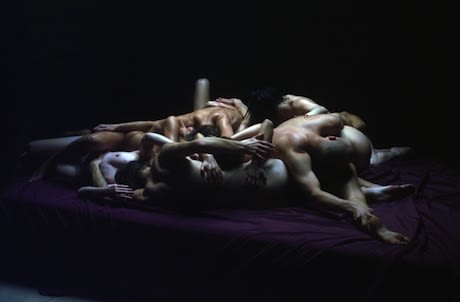There's so much artistry and attention to detail at work in Lithuanian sci-fi romance art film Vanishing Waves that it's almost painful to admit that, stripped of artifice, it's pretty much a fetishistic harlequin romance. However, while the core of the story is a syrupy, melodramatic passion play, it's one inspired by surrealism and the metaphysical science fiction of Stanley Kubrick and Arthur C. Clarke. As such, Kristina Buozyte's intimate exploration of mental infidelity is utterly gorgeous to behold and fascinating to experience, even though the destination isn't as satisfying as the journey. Director and co-writer Buozyte is clearly intrigued by science, psychology and sexuality, packing tons of peripheral ideas and philosophical discussions into a central story about a married scientist carrying on an affair with a comatose patient during an experiment in mind transference. Echoing the process used in The Cell, Lukas (Marius Jampolskis) is supposed to enter a young woman's mind and observe what he sees, nothing more. The neuron-transfer technology is more successful than anyone dared hope, a fact our field tester holds back after making contact with the interior self-projection of the very nubile Aurora (Jurga Jutaite). Soon overwhelmed by passion, Lukas misleads his co-workers, claiming he's making progress, but can't quite penetrate the abstract static of her mind, in order to extend his time with the sleeping beauty. These scenes inside their shared mindscape vary between raw and carnal, cloyingly romantic, sensuous and surreal, hauntingly beautiful, thoughtfully symbolic and frustratingly pretentious. Bound up in all the artful metaphors and sensory immersion — the sound design is as meticulously composed as the rest of the production — the deceptively simple plot follows the basic course of any romantic obsession story. Reality contaminates the fresh lust Lukas shares with Aurora and the unpleasant aspects of sharing mental space with another slowly seep into their bliss bubble, turning dreams into nightmares about the loss of control. Recognizing how powerful Peter Von Poehl's score is, the entire soundtrack, including a few remixes not used in the movie, is available on a second disc full of bonus features. In an interview, the director doesn't reveal much about the intent behind her film, likely preferring to leave this oblique love story up to interpretation; she's firm about her (successful) attempt to create a non-traditional sensory experience though. An indulgent "Making Of" utilizes a mix of raw behind-the-scenes footage and cast interviews that isn't especially illuminating. If you click all the way down the special features menu, you will find a secret photo gallery, but the draw of the bonus disc is Buozyte's first feature film, The Collectress, which, while lacking the elaborate visual artistry and polish of its predecessor, is a more compelling narrative than the engrossing, but patchy main event.
(Artsploitation)Vanishing Waves
Kristina Buozyte

BY Scott A. GrayPublished Aug 30, 2013



